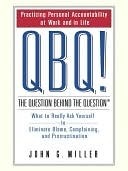More on this book
Community
Kindle Notes & Highlights
Read between
June 12 - June 13, 2019
What can I do to help out? and How can I provide more value?
The first QBQ guideline says all QBQs begin with “What” or “How,” not “Why,” “When,” or “Who.” Take another look at the “Why?” questions at the beginning of the chapter and consider what would happen if we asked these instead: “How can I do my job better today?” “What can I do to improve the situation?” “How can I support others?”
And one solution is to stop asking externally focused “When?” questions. Instead, we need to ask QBQs such as: “What solution can I provide?” “How can I more creatively reach my customer?” “What can I do to find the information I need to make a decision?” “How can I excel in my work right now?” Remember: The answers are in the questions.
We’re all on the same team. Every day, we see groups, departments, regions, and individuals work at cross purposes. Our so-called teams bicker and complain about the “others” who don’t “do their jobs right.” This kind of compartmentalization and infighting drains the life right out of an organization. It’s like having a tandem bike with the riders facing in opposite directions: lots of activity, lots of exertion, but no forward movement. With competitors working to beat us every day, can we really afford to be working against each other, too? Let’s climb out of our silos, forget the “we/they,”
...more
It’s not about “us” versus “them” or asking IQs such as “Why did they overbook the plane?” “When will ground operations get their act together?” or “Who dropped the ball?” The better question is “What can I do right now to make a difference?” With one simple choice, making the best of a bad situation, Bonita made a difference for every person on that flight. That’s how personal accountability changes the world: one choice at a time.
As we write in Flipping the Switch (the companion book to QBQ!), “Ownership does not require having an equity stake in the organization or holding an official position of leadership. It simply means facing problems head-on instead of blaming, complaining, procrastinating, or making excuses. Ownership is personal accountability in its purest form.” It’s also an idea each of us can commit to in every area of our lives. Ownership: A commitment of the head, heart, and hands to fix the problem and never again affix the blame.
Personal accountability begins with YOU!
This is why the second QBQ guideline is: All QBQs contain an “I,” not “they,” “we,” or “you.” Questions that contain an “I” turn our focus away from other people and circumstances and put it back on ourselves, where it can do the most good. We can’t change other people. We often can’t control circumstances and events. The only things we have any real control over are our own thoughts and actions. Asking questions that focus our efforts and energy on what we can do makes us significantly more effective, not to mention less frustrated and happier.
Here’s an integrity test for anyone who’s part of an organization: Does what we say about our organization while we’re at work match what we say at home? If it’s positive at work and negative a few hours later at home, we have a choice to make. Here’s an idea we should all consider: Believe or leave. I don’t mean for this statement to sound harsh. But if your organization is no longer a vehicle to help you reach your life goals, why stay? This is not to say we must completely agree with every initiative our organization puts forth or every decision management makes. Neither does it mean we
...more


